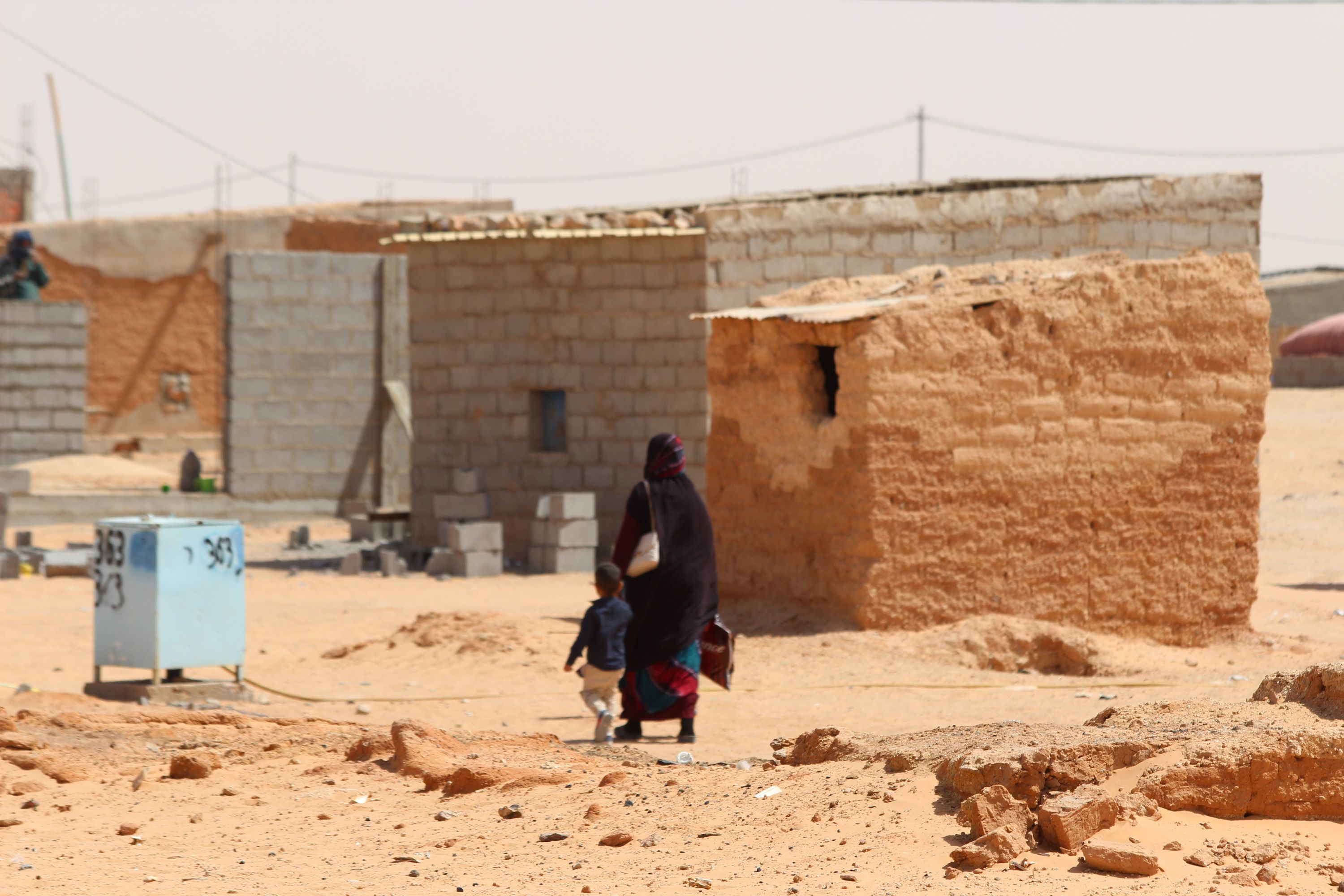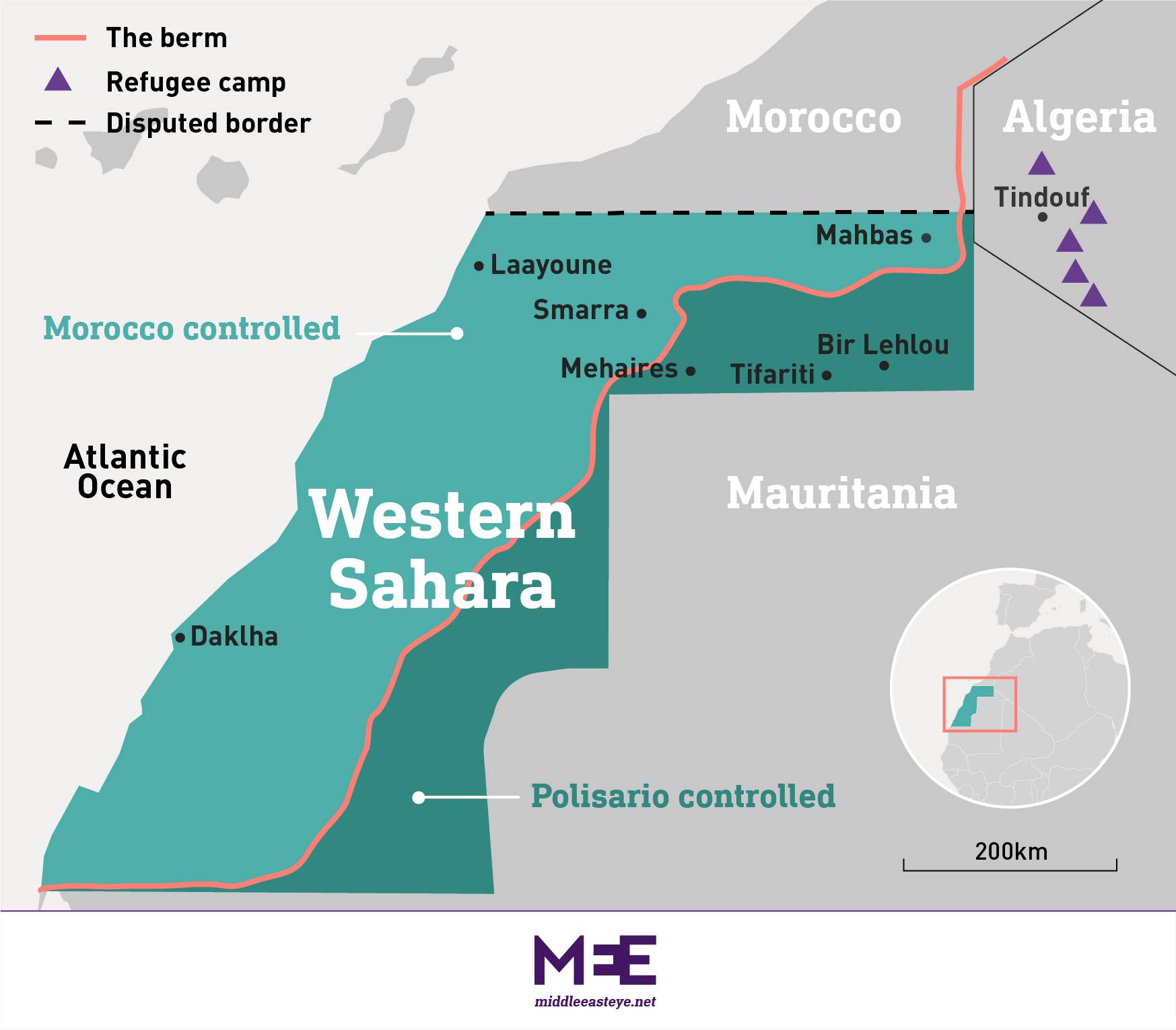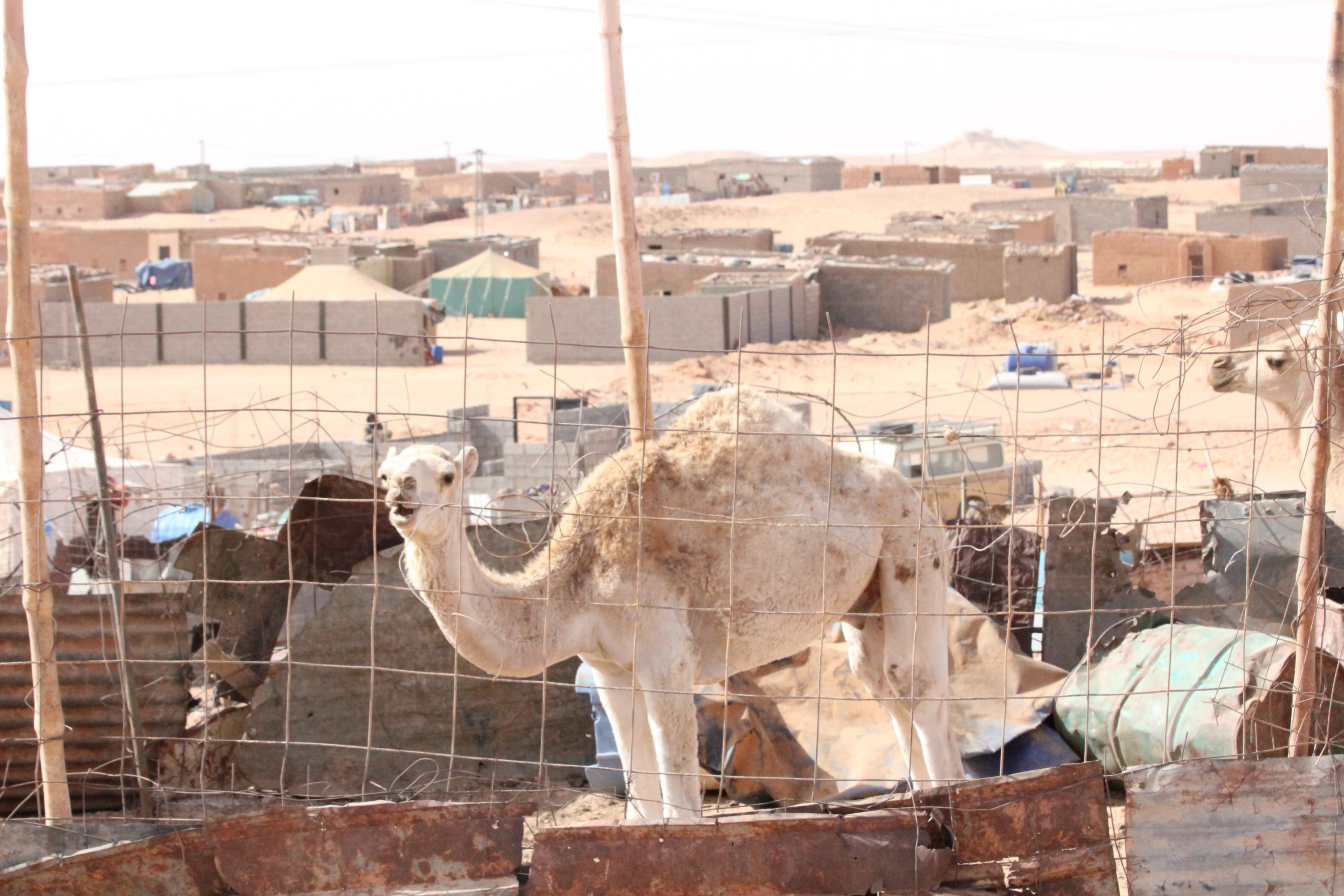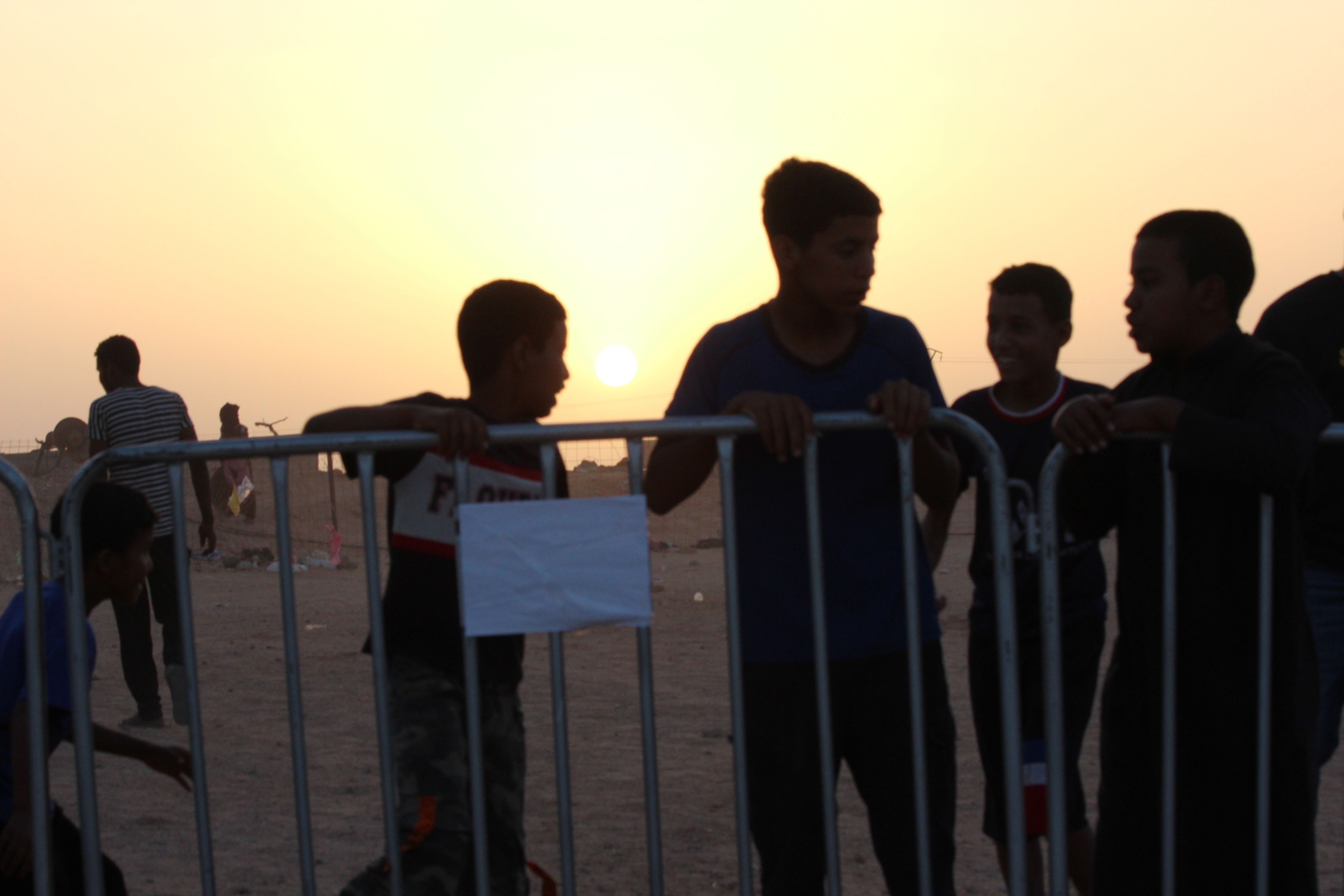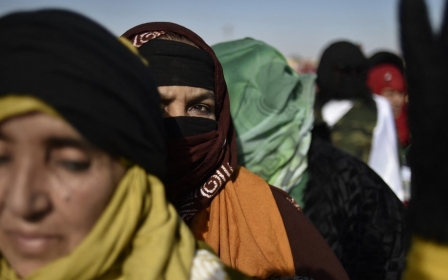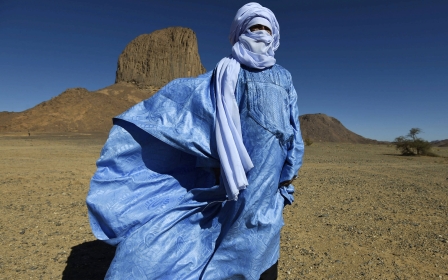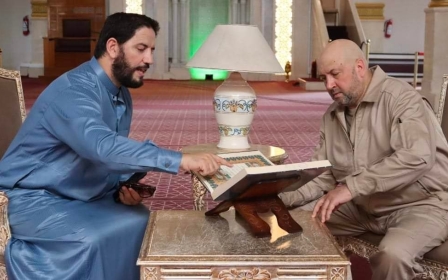War sent these refugees fleeing from Western Sahara, but they insist they will return
In the stretch of Western Sahara under Polisario Front control, the constant buzz of drones is now a continuous and maddening fact of life.
Sidate Side Bahia and Naim Ahmed Salm Ibarki remember hearing the sound on a fateful day in 2021. A decades-long ceasefire between the Polisario Front, a Sahwrawi liberation movement, and Morocco had collapsed in November 2020. In the skies, the two men heard drones homing in on their small homesteads.
They grabbed everything they could, jumped in a car, and fled across the border to Algeria, to join the hundreds of thousands of other Sahrawis living in exile.
They are now living in the Ausserd refugee camp, along with relatives and numerous others driven from the "liberated territories", as pro-independence Sahrawis call the 20 percent of Western Sahara not held by Morocco.
Their new home is still stacked with luggage from their escape. They left most of their belongings behind, including animals.
New MEE newsletter: Jerusalem Dispatch
Sign up to get the latest insights and analysis on Israel-Palestine, alongside Turkey Unpacked and other MEE newsletters
“Morocco doesn’t have any power, it’s just the drone airplanes,” Bahia told Middle East Eye from his new home.
“If they fought us just with Kalashnikovs they know what we’d do. They know what we did in the past, they know that we’re not scared of anyone.”
Both men once fought with the Polisario Front: first, against Spain during the country’s 92-year rule of their homeland; and then against Morocco and Mauritania, when the neighbours moved in to carve up the territory after the Spanish left in 1976.
As part of Polisario, they helped wrestle control of the liberated territories using, by their own admission, nothing but Kalashnikovs and cars. Around 170,000 refugees from that war are now residing in camps in Algeria like Ausserd.
A ceasefire was established in 1991 that consolidated Morocco’s control of the territories west of the artificially built sand wall known as the Berm. Everything to its east is administered by Polisario.
'We’d love to start the war again. It’s a bad thing, but we don’t have any solution'
– Sidate Side Bahia, Sahrawi refugee
That truce was agreed with the understanding a referendum would be held by Sahrawis to decide whether they would live independently or under Moroccan rule. Yet it never materialised, and with the US now recognising Morocco’s sovereignty over the territory, both Bahia and Ibarki now feel that period was effectively wasted - and wish they’d never put down their arms.
“The US promised that they would find a solution for us and in the past 30 years they didn’t say anything,” said Ibarki.
Bahia, who is now 80, concurred. He echoed sentiments that have also become increasingly common among those in the camp too young even to remember the first war with Morocco.
“We didn’t want anyone to help us. If you want to help us, welcome to you. If you don’t want to help us, we don’t care. The difficulty is if someone makes a promise and they lie,” he said.
“We’d love to start the war again. It’s a bad thing, but we don’t have any solution.”
'We would leave tomorrow'
Polisario declared the ceasefire over in late 2020, targeting Moroccan bases along the Berm. Morocco, meanwhile, has targeted the liberated territories, mostly with drone strikes.
The raids and insecurity have prompted thousands to flee either into Mauritania or into Algeria's refugee camps, which are administered by Polisario under Algiers' aegis.
According to Khira Bulahi, the governor of Ausserd camp, around 4,000 people had flooded into her camp since 2020 alone. Before the fighting began, an estimated 10,000 people lived in the liberated territories, an area the size of Greece.
'It’s so difficult to be born in a refugee camp and hear people talking about your land, and saying, "Oh, it has a beautiful beach, it has beautiful fish"'
- Mant Agulha, 19
That wave of displacement took place at the height of the Covid-19 pandemic, adding an extra layer of hardship for authorities struggling to cope with absorbing more people into a living environment that already suffered from scant resources, regular power cuts, a lack of running water and minimal healthcare facilities.
There is little romance or affection for the camp among those who live there.
New buildings are springing up, built with concrete, a contrast to the tents and clay dwellings used for decades. Yet this is not a sign of permanence, residents insist.
There is still an overriding belief that their lives here are temporary and that they will eventually return to Western Sahara, a belief shared even by those who have never seen their homeland.
Bulahi told MEE that there simply were not enough resources to create a new refugee camp for people fleeing the liberated territories, despite the number of people. So these new refugees were distributed among the five camps near the town of Tindouf in Algeria.
"There were huge numbers coming from the liberated zones to here, and it wasn’t easy. They flee, that’s what they had to do just to save their lives. And our responsibility was just welcoming the Sahrawis wherever they’re coming from," she said.
She said many of the refugees had been left "traumatised" by the experience and Bulahi's staff had to focus on providing healthcare for those with injuries, and getting children back into school.
Now, the population of the refugee camps is bigger than ever, which could be seen as a step backwards for a national movement trying to return to their homeland.
Yet Bulahi batted away the suggestion that Sahrawis were putting down roots in the camp, or that the building of houses with more permanent infrastructure and the new influx of people implied they were there for the long haul.
"It’s totally the opposite. That’s just the appearance," she said. "It’s individuals’ work... when you look more to the buildings, they are not straight behind each other, they are not organised.
"Everything we have done, we have done expecting we would leave tomorrow," she added.
'Nobody believes the Earth is for us'
For the young people who have spent their lives in the refugee camps, and who have only ever seen non-violent political solutions being pushed further and further into the background, the prospect of conflict can be attractive.
In the minds of many, the largely empty deserts of southwestern Algeria are a purgatory that offers no prospects. Their Moroccan-controlled homeland - resting on the Atlantic and offering the sea, fishing and rich natural resources (including valuable phosphate mining) - is the focus of their hopes.
Mant Agulha, Sidate Side Bahia's grand-niece, became visibly teary as she spoke about Western Sahara, despite the 19-year-old never having been there.
"We miss our homeland. It’s so difficult to be born in a refugee camp and grow up and hear people talking about your land, and saying, ‘Oh, it has a beautiful beach, it has beautiful fish, it has a lot of things’, and for us it’s so difficult," she said.
"Nobody believes the Earth is for us."
Bulahi said the camp authorities had to actively work to prevent young men from immediately leaping to join the conflict. She said there was a training camp for those who want to fight, but it is only for those over 20, and voluntary.
"The biggest problem we faced after the ceasefire is convincing our young people that it’s not necessary" to go to fight, she said, adding that they encouraged them to stay in education instead.
"And even if they choose to go to fight, we didn’t tell them to go to die."
A forgotten struggle?
Polisario Front officials have been at pains to stress that they have no desire to go to war for the sake of war, and that responsibility for the violence rests with Morocco.
Ordinary Sahrawis are often less diplomatic, however. In their mind, the world has forgotten about their struggle and thrown its weight fully behind Morocco, with the sole exception of Algeria.
Last week, France announced its participation in funding a three-gigawatt power cable linking the Moroccan city of Casablanca to the town of Dakhla in Western Sahara.
Paris has also signalled support for Morocco's proposed autonomy plan, which nominally grants a degree of self-governance to Western Sahara but has been fiercely rejected by Polisario.
Most damagingly, in 2020 the Trump administration agreed to recognise Morocco's sovereignty over Western Sahara in exchange for the kingdom restoring ties with Israel.
And despite some finger-wagging by Democrats at the time, President Joe Biden has not reversed the recognition. US government maps of the region integrate the territory with Morocco, unlike those in the rest of the world.
Side Bahia bitterly dismissed the agreement as a "commercial exchange", while Salm Ibarki said the US just naturally went with "who has the power".
"They left us in the way, they let the world forget about us," he said.
Both men have, according to their families, been fairly inactive since coming to the camp. But they dismissed any suggestion that they were depressed or despondent about their situation.
"We aren’t scared of anything. Even kids of 10 years old want to go to the war," said Side Bahia.
"If you speak to them, you say, ‘Oh look, it’s a man!’"
This article is available in French on Middle East Eye French edition.
Middle East Eye delivers independent and unrivalled coverage and analysis of the Middle East, North Africa and beyond. To learn more about republishing this content and the associated fees, please fill out this form. More about MEE can be found here.


